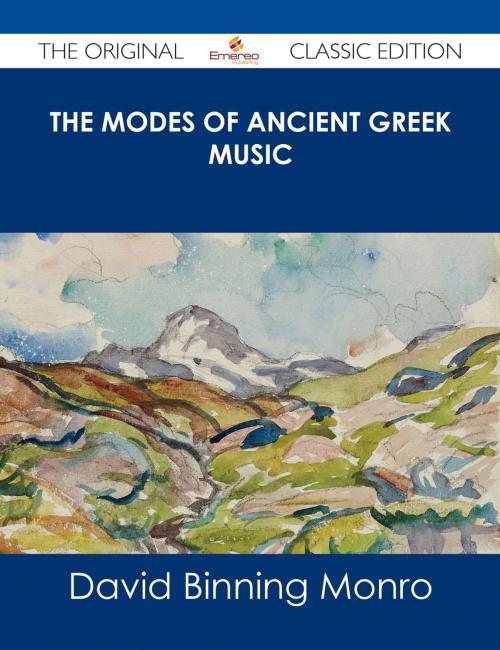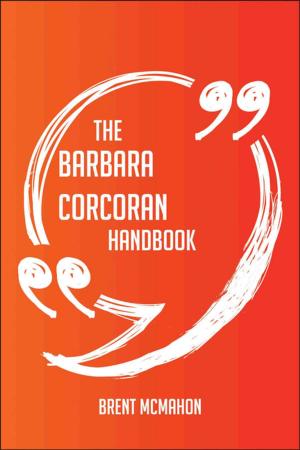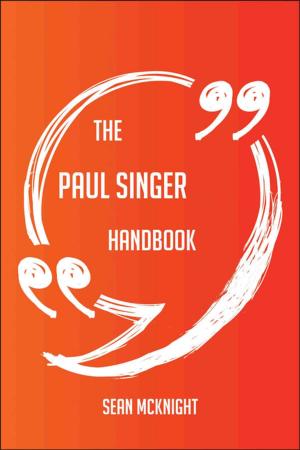The Modes of Ancient Greek Music - The Original Classic Edition
Nonfiction, Reference & Language, Reference, Fiction & Literature| Author: | David Binning Monro | ISBN: | 9781486448852 |
| Publisher: | Emereo Publishing | Publication: | March 18, 2013 |
| Imprint: | Emereo Publishing | Language: | English |
| Author: | David Binning Monro |
| ISBN: | 9781486448852 |
| Publisher: | Emereo Publishing |
| Publication: | March 18, 2013 |
| Imprint: | Emereo Publishing |
| Language: | English |
Finally available, a high quality book of the original classic edition of The Modes of Ancient Greek Music. It was previously published by other bona fide publishers, and is now, after many years, back in print.
This is a new and freshly published edition of this culturally important work by David Binning Monro, which is now, at last, again available to you.
Get the PDF and EPUB NOW as well. Included in your purchase you have The Modes of Ancient Greek Music in EPUB AND PDF format to read on any tablet, eReader, desktop, laptop or smartphone simultaneous - Get it NOW.
Enjoy this classic work today. These selected paragraphs distill the contents and give you a quick look inside The Modes of Ancient Greek Music:
Look inside the book:
It appears from a well-known passage in the Republic of Plato, as well as from many other references, that in ancient Greece there were certain kinds or forms of music, which were known by national or tribal names—Dorian, Ionian, Phrygian, Lydian and the like: that each of these was believed to be capable, not only of expressing particular emotions, but of reacting on the sensibility in such a way as to exercise a powerful and specific influence in the formation of character: and consequently that the choice, among these varieties, of the musical forms to be admitted into the education of the state, was a matter of the most serious practical concern. ...I shall endeavour to show that there was no such double use: that in the earlier periods of Greek music the scales in use, whether called tonoi or harmoniai, differed primarily in pitch: that the statements of ancient authors about them, down to and including Aristoxenus, agree as closely as there is reason to expect: and that the passages on which the opposite view is based—all of them drawn from comparatively late writers—either do not relate to these ancient scales at all, or point to the emergence in post-classical times of some new forms or tendencies of musical art. ...The object of the foregoing discussion has been to show, in the first place, that there was no such distinction in ancient Greek music as that which scholars have drawn between Modes (harmoniai) and Keys (tonoi or tropoi): and, in the second place, that the musical scales denoted by these terms were primarily distinguished by difference of pitch,—that in fact they were so many keys of the standard scale known in its final form as the Perfect System.
Finally available, a high quality book of the original classic edition of The Modes of Ancient Greek Music. It was previously published by other bona fide publishers, and is now, after many years, back in print.
This is a new and freshly published edition of this culturally important work by David Binning Monro, which is now, at last, again available to you.
Get the PDF and EPUB NOW as well. Included in your purchase you have The Modes of Ancient Greek Music in EPUB AND PDF format to read on any tablet, eReader, desktop, laptop or smartphone simultaneous - Get it NOW.
Enjoy this classic work today. These selected paragraphs distill the contents and give you a quick look inside The Modes of Ancient Greek Music:
Look inside the book:
It appears from a well-known passage in the Republic of Plato, as well as from many other references, that in ancient Greece there were certain kinds or forms of music, which were known by national or tribal names—Dorian, Ionian, Phrygian, Lydian and the like: that each of these was believed to be capable, not only of expressing particular emotions, but of reacting on the sensibility in such a way as to exercise a powerful and specific influence in the formation of character: and consequently that the choice, among these varieties, of the musical forms to be admitted into the education of the state, was a matter of the most serious practical concern. ...I shall endeavour to show that there was no such double use: that in the earlier periods of Greek music the scales in use, whether called tonoi or harmoniai, differed primarily in pitch: that the statements of ancient authors about them, down to and including Aristoxenus, agree as closely as there is reason to expect: and that the passages on which the opposite view is based—all of them drawn from comparatively late writers—either do not relate to these ancient scales at all, or point to the emergence in post-classical times of some new forms or tendencies of musical art. ...The object of the foregoing discussion has been to show, in the first place, that there was no such distinction in ancient Greek music as that which scholars have drawn between Modes (harmoniai) and Keys (tonoi or tropoi): and, in the second place, that the musical scales denoted by these terms were primarily distinguished by difference of pitch,—that in fact they were so many keys of the standard scale known in its final form as the Perfect System.















